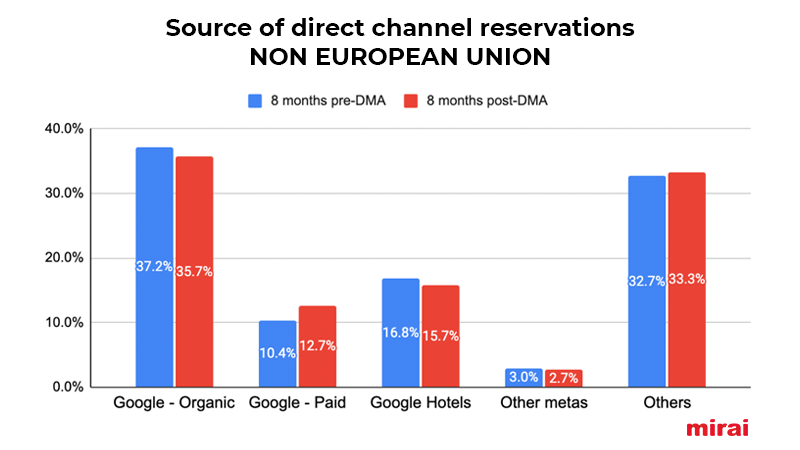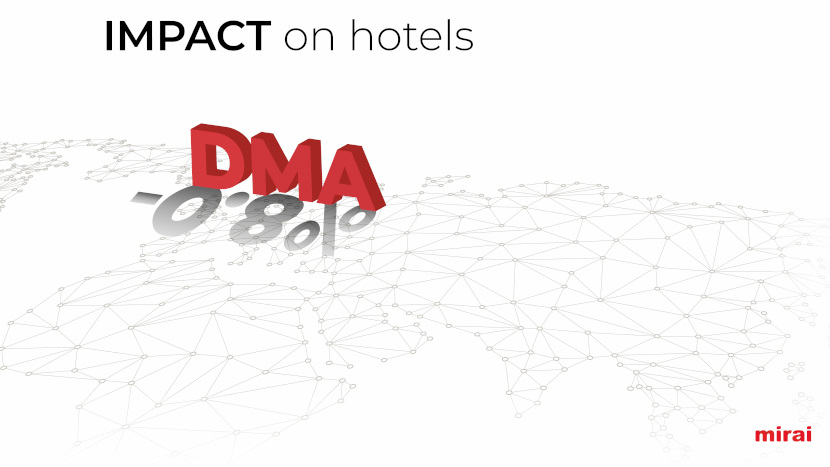Last June we discussed the winners and losers of the DMA or Digital Markets Act in Europe based on our own metasearch tracking data of more than 3,000 properties worldwide.
NB: This is an article from mirai, one of our Expert Partners
Subscribe to our weekly newsletter and stay up to date
Trying to shed some more light on this complex issue of “the impact of the DMA for hotels”, we expanded our research to:
- Analyze the attribution of all bookings and not only those coming from metasearch.
- To do so, we had to go beyond our own metasearch integration tracking data and switched to Google Analytics 4 as our data source instead.
- As a consequence, we used the new Google Analytics 4 data-driven attribution model, quite different from other models such as last click and first click.
- Expanded the timeframe from 4 to 8 months before/and after the DMA (Jan. 19 2024).
What we did not change was the 3,000+ properties as the perimeter of our analysis. Additionally, it’s important to point out that not all these properties invest in Google Ads, Hotel Ads or other metasearch players. What we are trying to measure is the % of traffic shifted not that much the absolute numbers.
Our analysis reveals that the DMA has led to Google suffering an overall 1% decline in its market share of all direct hotel bookings within the EU, marking a significant shift in how users interact with hotels via Google platforms.
However more importantly the study – leveraging Google Analytics 4 data-driven attribution model – found that specifically Google Hotels’ share of direct bookings plummeted from 13.4% to 8.9% within the EU, a 4.5 percentage points decrease.

Nonetheless, Google managed to recapture 82% of that loss through other Google placements such as Google Ads and organic search where it saw a 1.5 and 2 percentage points increase in the overall share of direct bookings for hotels within the EU.
Upon conducting the aforementioned analysis in Non European markets, the numbers reveal a very different reality:
- Google Hotel Ads loses some share, yet a fraction when comparing with the EU situation. Google Hotel remains as a key source of bookings for hotels reinforcing the importance of showing your direct rates there ideally with the best price compared to OTAs.
- Paid traffic increased significantly growing 20% up to 12.7% of the total generated bookings. Organic traffic slightly decreases and loses some share.
- Overall, Google ecosystem remains pretty flat (-0.29%), although with a higher proportion of paid which translates into higher hotel costs. Clearly a bad effect for hotels.
- Other metasearch lost 10% to 2.7%.

Conclusion
Based on our ongoing analyses since the DMA was rolled out it is clear that the DMA is having a significant impact in the way users (demand) interact with hotels (supply) through Google, the leading search engine in the EU.
Within the Google ecosystem Hotel Ads is taking the most severe impact, decreasing its relative share by -33%. Even though the numbers show that a portion of the lost visibility is recouped by other google solutions (organic & paid) the net effect of the DMA is that the OTAs are getting an increase of visibility within Google which undeniably results in more business captured by the OTA increasing the hotels costs and their dependency on third party distribution. Was this outcome the intended outcome of the EU regulators? Certainly not.
“The Digital Markets Act was designed to increase competition but whilst it reduced Google’s overall share by 1% of direct hotel bookings it has unintentionally increased its influence in both organic and paid, thus arguably increasing the cost of direct distribution for hoteliers” said Javier Delgado, CEO at Mirai. “The study additionally found that within the EU the overall share that other meta search engines have a direct hotel bookings actually increased, but by just 0.2 percentage points. So hoteliers shouldn’t give up on other meta search websites yet as a source of modest, but potentially important, bookings.”
In any case, the DMA case is far from over and we will most likely see further changes in the distribution arena. As we reported on our post update in late May, the EU ratified Booking.com´s gatekeeper self designation on May 13th. As a result Booking.com should be DMA compliant by November 13th, we have already seen fundamental changes in Booking.com´s business practices like the full removal of the parity clause in EU markets announced on June 25 th and applied across all of their contracts on July 1st.





